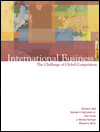 |  International Business : The Challenge of Global Competition, 8/e Donald Ball
Wendell H. McCulloch,
California State University Long Beach
Paul L. Frantz,
California State University Long Beach
Michael Geringer,
California Polytechnic State University
Michael S. Minor,
University of Texas Pan American
Economic Theories of International Business
Internet AssignmentsStudents: Included here are some internet/case assignments that you can use to review
or that your instructor may give as assignments. Your instructors have been
given the answers to these questions and may choose to give them out to you
or not.
This case is designed to:
- Expose you to an actual trade war that has been viewed by many as trivial;
- Illustrate how the World Trade Organization responds to trade restrictions;
and
- Require the student to assess the US's response to restrictive trade policies
in the European Union.
During and after World War II, food rationing was common in Europe. Products that
are taken for granted today, such as bananas, were in short supply. As is often
the case, humans tend to crave that which is not readily available. Thus begins
the story of the great banana war.
Bananas thrive in tropical climates. It just so happened that a number of the
British and French colonies were located in the Caribbean and Pacific islands,
and in an assortment of African states. To ensure a continuous supply of bananas
should there ever be another need for food rationing, the British and the French
encouraged banana farming in these tropical colonies. The colonies responded by
producing a steady and dependable supply of the fruit to Europe. Over time, however,
huge banana farms on the South American mainland such as Chiquita, Dole and Del
Monte became more and more competitive and threatened the livelihood of the small
banana farmers in the British and French colonies. The British responded to this
threat by levying tariffs and quotas against the South American competitors. The
European Union (EU) formally adopted this quota system in 1993.
Almost immediately, the battle lines formed. On one side were Chiquita, Dole and
Del Monte, along with the various countries where they operated, and other countries
that favored the free market approach. On the other side were an assortment of
African states, Caribbean and Pacific islands, and sympathetic colonizers who
favored the tariffs and quotas. In the middle was the General Agreement on Tariffs
and Trade (GATT), clearly ruling that the banana quota system was a restraint
of trade.
That should have been the end of it. However, from 1993 to the present time, the
great banana war continued to fester with Europe still shunning the rival bananas.
Feeling that it needed to do something, the United States (US) retaliated in 1999
by deciding to impose punitive tariffs of 100% on European goods ranging from
cashmere to cheese. The EU cried fowl and charged the US with violating World
Trade Organization (WTO) rules.
The US and WTO's official texts related to the great banana war can be found at
"The US-EU Dispute on EU Banana Regime", http://www.useu.be/issues/bananadossier.html
.
Case Instructions:
Answer the following questions:
- What is the specific chronology of events related to the great banana war?
Go here to find out: http://www.useu.be/issues/chron0705.html
- What were the specific charges that the EU filed against the US? Go here
to find out: http://www.useu.be/issues/bana1211.html
- How did the WTO respond to the EU claims against the US tariffs in the banana
dispute? Go here to find out: http://www.useu.be/issues/bana1211.html
- Do you think that the US was correct in imposing the punitive tariffs on
European goods? Why or why not. (If you would like additional information
before answering this question, try using the search term "banana war"
with your favorite search engine).
|
|




 2002 McGraw-Hill Higher Education
2002 McGraw-Hill Higher Education